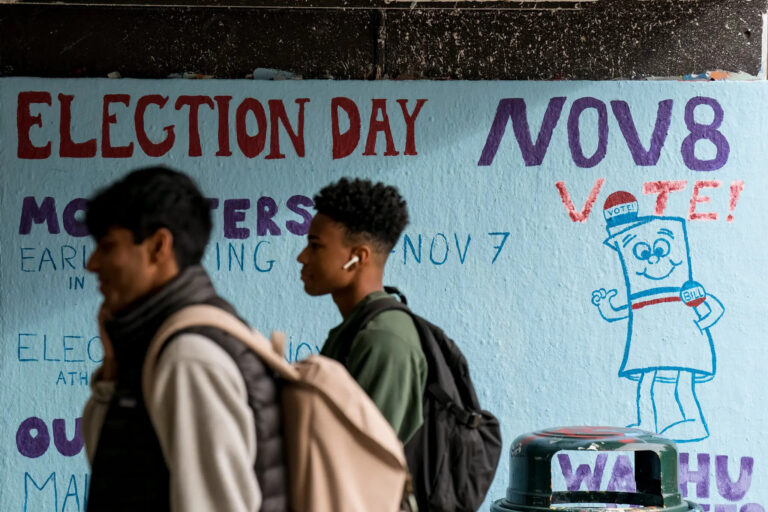
On Nov. 1, 2024, a coalition of European Green parties called for Green Party candidate Jill Stein to drop out of the U.S. presidential race and endorse Democratic candidate Kamala Harris. They argued that “the stakes of these elections could not be higher,” since Donald Trump has promised to restrict abortion access, deport immigrants en masse, take away the rights of millions of people within the LBGTQ+ community, and dismantle democratic institutions.
The U.S. Green Party responded to the European Greens’ critiques in a press release, arguing that their voters had no intention of voting for either one of the major-party candidates anyway, so her candidacy would not impact the results of the election. They also called for the European Greens to support their demand for “a national popular vote by ranked-choice voting for president, which would eliminate the alleged spoiler factor.”
However, America does not have ranked-choice voting for president, and it is unwise for progressives to vote as if it does. In our current system, a vote for the Green Party is a vote that will only benefit the Republicans, which is why right-wing groups spent hundreds of thousands of dollars to support Stein in Wisconsin, a crucial battleground state.
Progressive third party voters’ frustration with the Democratic Party is understandable. The Democratic Party is not perfect, but in a system where only a Democrat or a Republican can win, the policies of the Democrats are objectively more aligned with the interests of progressive voters than the policies of Republicans. To see progressive policy put in place, the solution is getting progressives on the Democratic ticket during the primaries and pressuring elected Democrats to support progressive policies. If Democrats are not elected, progressives will have no influence on policy.
In the case of the Israel-Palestine conflict, protests organized by left-wing activists and critiques from progressive members of Congress were able to get President Biden to shift his stance to be more critical of Israel. Biden eventually called for a ceasefire and threatened to stop arms shipments to Israel if the humanitarian conditions in Gaza are not improved, showing that progressives are able to influence the policy decisions of Democratic representatives. Progressives will not have the same influence once President-elect Donald Trump is back in the White House. His provocative decision to recognize Jerusalem as the capital of Israel and to move the U.S. embassy there is a clear indication of his hostility towards Palestinians and is evidence that he will not fight to improve the conditions in Palestine.
Bernie Sanders’ approach of changing the Democratic Party from within is more effective at impacting policy. Of course, Bernie lost the primary in both 2016 and 2020, but his primary bids led to the Democratic Party embracing some progressive policies in the official party platform and eventually passing progressive legislation. A great example of Bernie Sanders’ impact is the Inflation Reduction Act which was signed into law by Joe Biden and included progressive policies such as tax credits for renewable energy production to combat climate change and allowing Medicare to negotiate drug prices. Two of Bernie Sanders’ signature policy proposals were Medicare for All and a Green New Deal, and while the Inflation Reduction Act certainly didn’t implement the bold policies that Bernie proposed, it did take some key elements from them. The fact that Bernie was so close to winning the Democratic primary in 2020 showed that his ideas were so popular within the party that Democrats felt compelled to embrace some of his ideas. Jill Stein’s strategy hasn’t made any impact on the Democratic Party’s platform, and it won’t until the U.S. embraces a ranked-choice voting system — which is very unlikely at this time.
Having progressive third parties in the U.S. is not a bad thing, but if the Green Party wants to create change, their strategy is very flawed. The party does not put much effort into garnering support between presidential elections, and this is especially true for down-ballot candidates. If they focused more on gaining support at the local level, especially in very progressive areas, they would be taken more seriously. Further, the strategy of protest voting that some Stein voters engaged in for the 2024 election was flawed. If protest voting was successful and Stein voters blocked the Democrat from winning the presidency, they effectively forfeited their ability to influence the policies of the president for the next four years. That’s a really hard pill to swallow, especially when the other option is a convicted felon who has repeatedly made comments undermining American democracy which led to a group of his supporters storming the U.S. Capitol.
The Zeitgeist aims to publish ideas worth discussing. The views presented are solely those of the writer and do not necessarily reflect the views of the editorial board.



